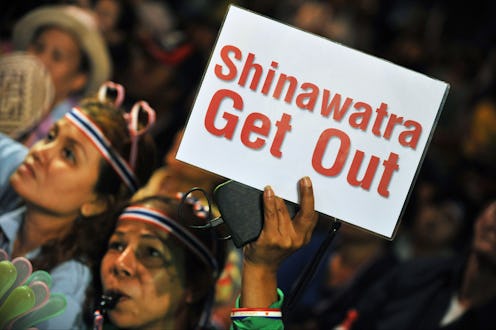News
What on Earth Is Going on in Thailand?
In case you missed it, some crazy stuff is going down in Thailand right now. Prime Minister Yingluck Shinawatra partly disbanded Parliament Monday morning and promised Feb. 2 elections in the hopes that, after weeks of protests calling for her overthrow, everyone will just simmer down already. "At this stage, when there are many people opposed to the government from many groups, the best way is to give back the power to the Thai people and hold an election," Yingluck said. "So the Thai people will decide."
But Yingluck's attempts at placating the protestors don't seem to be working. Today's estimated 140,000 protestors, led by her political rival Suthep Thaugsuban, continued to call for a "final showdown" with the government. They're on their way to try to storm Thailand's aptly named seat of government. "Today, we will continue our march to Government House," Suthep said. "We have not yet reached our goal. The dissolving of parliament is not our aim."
Protestors are currently converging around the House. Police are unarmed, pledging to use tear gas only if necessary.
Since the end of November, the 100,000 to 150,000 protestors in Bangkok have called for a 'people's council' to replace the current, democratically elected, slightly-incestuous government. They accuse Yingluck of acting as her older brother, former Prime Minister Thaksin's, puppet. If that's true, Thaksin would effectively still be in control of the country — and he wasn't terribly popular when he was PM. (He was overthrown by the military in 2006, and fled the country on corruption charges two years later.)
And according to Suthep, Thaksin's at it again. Suthep wants to overthrow the Shinawatras' government and replace it with a temporary 'people's council' that could conceivably draw on heavy support from his former party.
A change in party would be the first Thailand's had since the beginning of the century. According to a BBC analysis:
The core of the opposition's grievances is the belief that the five consecutive election victories by the governing party were "bought", either by bribes, or through unsustainable, populist policies. But all the data shows clear and strong support in Thailand's north and north-east for the government, and that all the recent election results broadly reflected the will of the majority.
Even if a complete revolution can be held off until elections, the chances aren't great for Yingluck's reelection. She was hugely successful in the last election in 2011 — taking just under 50 percent of the vote — and her party, Pheu Thai, won a Parliamentary majority.
With anger exacerbated by an ongoing, under-reported insurgency by the Malay-Muslim separatists in the south, Thailand's political instability is such that even Yingluck's party spokesperson isn't sure she'll have support from within.
"I don't know whether the Pheu Thai Party will still vote (for) her to run again or not," said spokesman Teerat Ratanasevi.
